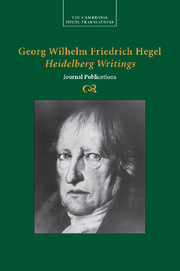Appendix: Excerpts from letters by Hegel, Jacobi, and Jean Paul concerning Hegel's review of Jacobi's works
Published online by Cambridge University Press: 10 December 2009
Summary
Hegel's letter to Immanuel Niethammer, dated April 19, 1817, indicates that he consciously intended his lengthy and for the most part positive review to help effect a reconciliation with Jacobi, whom his scathing remarks in Faith and Knowledge (1802) had deeply estranged. Hegel writes,
[A]s I see, the main letter I wrote to Munich reached its addressee, and I am very pleased at your news that I succeeded in expressing and fulfilling my intention in the review. I thank Jacobi warmly for the friendly welcome he gave to this essay. An Encyclopedia is supposed to be ready by Easter. 6 sheets of it are printed. Copies for you and Jacobi have been ordered. I do not begrudge God that he makes things so miserable for us, but rather that in the end he does not allow our achievements to reach the degree of perfection we wanted and of which we could have been capable.
Just a few months later, Hegel was instrumental in persuading the University of Heidelberg to grant Jacobi's close friend Jean Paul, the novelist, an honorary doctorate, and no doubt this new friendship between Hegel and Jean Paul also helped facilitate the rapprochement between Hegel and Jacobi. In any case, in a letter dated September 3, 1817, Jean Paul confirms Jacobi's impression of a convergence, writing, “Hegel has come much closer to you, except for just one point concerning the will.”
- Type
- Chapter
- Information
- Georg Wilhelm Friedrich Hegel: Heidelberg WritingsJournal Publications, pp. 137 - 139Publisher: Cambridge University PressPrint publication year: 2009

